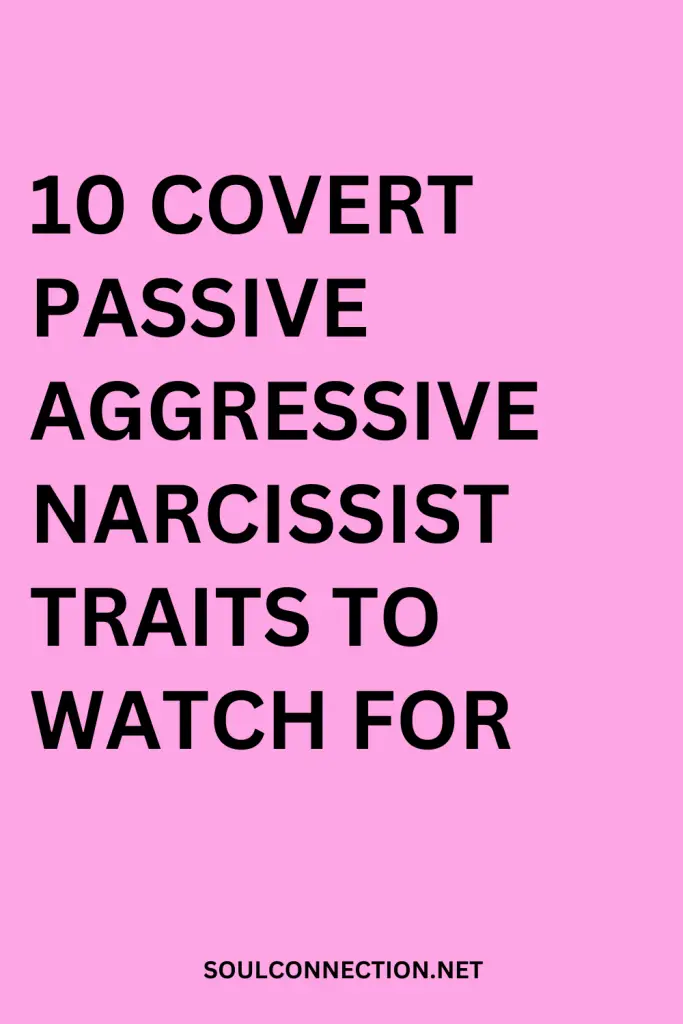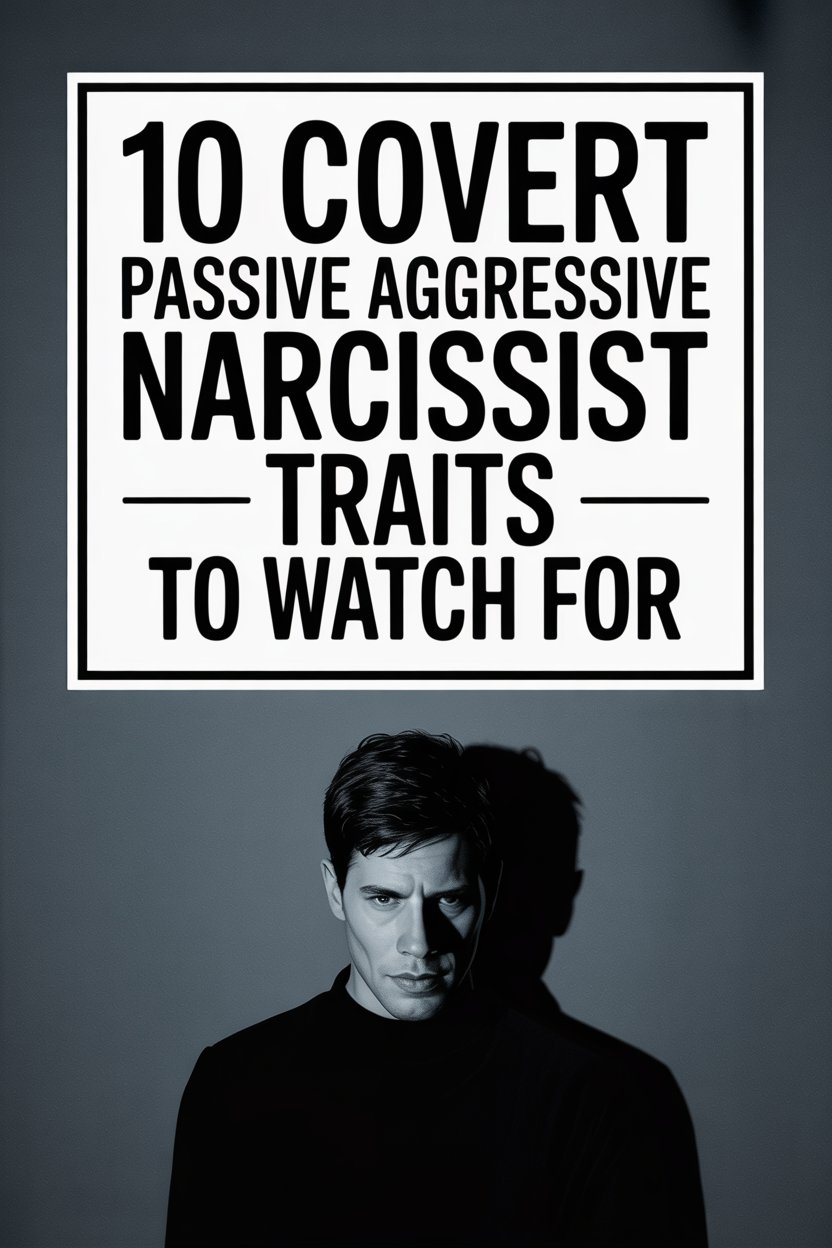Ever had a conversation that made you feel like you were playing chess with an opponent who moved the pieces while your back was turned?
Welcome to the world of covert passive aggressive narcissists—masters of making you question your own reality, all while appearing to be as harmless as a kitten in a basket.
Their moves are rarely loud or explosive. Instead, they’re subtle, quietly eroding your confidence and peace of mind.
Grab a cuppa (or something stronger), and let’s unmask these slippery behaviors together—so you can spot them, sidestep the emotional mind games, and finally stop blaming yourself for the weird vibes in your relationship.
1. The Compliment That Bites
Passive aggressive narcissists have perfected the art of weaponizing praise. Think of compliments that come with a sting: “You look great in that dress! I never thought you could pull off something so bold.”
Translation? “You’re not usually attractive.”
These backhanded gems often leave you scrambling to decode what just happened. Were they being nice or was that a jab? Spoiler alert: It was definitely a jab, delivered with a smile.
Expect these compliments at family gatherings, in front of colleagues, or anytime you feel vulnerable and need actual support—not a subtle dig.
2. Mysterious Forgetfulness
Ever notice how your partner “forgets” your birthday, but can recall the exact number of sprinkles on their donut last Tuesday? This kind of forgetfulness isn’t cute. It’s deliberate.
Dates, promises, and important conversations slip their minds when it suits them—especially when remembering would mean putting in effort for you.
When pressed, they’ll look genuinely puzzled, as if you’re accusing them of inventing a new crime. (“Was I supposed to pick you up? Oh, I totally forgot. You know how busy I am.”)
The goal: to make you feel insignificant, while they feign innocence.
3. Chronic Victimhood
No matter what goes wrong, the covert narcissist finds a way to be the real victim. Missed your work party because they were “too tired”? Clearly, you’re insensitive for trying to drag them out in the first place.
Upset because they flirted shamelessly at a dinner party? “How could you accuse me of something so hurtful after all I do for you?”
Their pain or stress, real or manufactured, always trumps yours. Even when you stub your toe, somehow you’re apologizing for making too much noise and disturbing their zen.
4. The Silent Treatment Olympics
Passive aggression’s most celebrated sport: the silent treatment. They don’t yell or throw things—they just disappear emotionally, leaving you wandering in a conversational desert.
The silent treatment can last hours, days, or just long enough to get you begging for forgiveness (for a crime you’re still trying to figure out).
It’s their way of taking control, without ever raising their voice. If the room suddenly feels 10 degrees colder, you know the games have begun.
5. Guilt-Tripping Like a Pro
No one lays on the guilt quite like a covert narcissist. They can turn even the most basic request into an emotional crisis. Want to go out with your friends?
Brace yourself for a monologue about how lonely they’ll be, how hard their week has been, and how you’re clearly abandoning them in their hour of need.
Cue the sighs, the long faces, and maybe even a dramatic door slam for added effect. If you find yourself canceling plans to nurse their bruised ego, you’ve just been guilt-tripped by a pro.
6. The Perpetual Martyr
Nothing says “I’m better than you” quite like the humble martyr routine. Covert narcissists love to remind you of all the sacrifices they make—every single day—just to keep your life running.
“I stayed up all night helping you with your project, and this is the thanks I get?” Or, “I always put everyone else first, but nobody ever appreciates me.”
Their martyrdom is never quiet. It’s loudly broadcasted, often to the nearest willing listener (bonus points for public displays of self-pity). Their goal? Keep you feeling indebted, even if all they did was pick up the milk.
7. Sabotage by Suggestion
Subtle sabotage is their specialty. Did you mention starting a new hobby, looking for a job, or planning a trip? Suddenly, your plans hit a wall of “helpful” advice and gentle discouragement.
“Oh, that’s really ambitious—are you sure you’ll have the time?”
“I just worry you’ll be disappointed if it doesn’t work out.”
“Wouldn’t it be better if you just relaxed at home for once?”
These comments are designed to chip away at your confidence, all while sounding like concern. If your self-belief starts leaking out like air from a punctured tire, it’s probably not a coincidence.
8. Emotional Withholding
Affection, validation, and even basic warmth are tightly rationed. Covert narcissists withhold love as a form of control, doling it out only when it benefits them.
Did you upset them? Prepare for cold shoulders and zero affection. Did you manage to soothe their ego and praise their “generosity”? Suddenly, they’re all hugs and smiles.
Love isn’t a constant; it’s a reward for good behavior (as defined by them, of course). The more you crave it, the more they pull back.
9. The Art of Subtle Blame
Somehow, everything can be traced back to something you did or didn’t do. If the dinner burns, it’s because you distracted them. If they’re late, it’s because you didn’t remind them.
If they’re unhappy, it’s because you’re “too sensitive,” “too dramatic,” or “never satisfied.”
The blame is rarely direct. Instead, it’s implied in offhand remarks and heavy sighs. This drip-feed of fault keeps you on edge, forever examining your own actions, hoping to one day get it right (spoiler: you won’t).
10. Gaslighting Lite
Gaslighting doesn’t always come in the form of wild conspiracy theories. Sometimes, it arrives as gentle suggestions that you’re overreacting, misremembering, or just not as “emotionally stable” as you thought.
“Are you sure that happened? I think you’re being a bit dramatic.”
“I never said that—you must have misunderstood.”
“It was just a joke. Why are you always so sensitive?”
These remarks chip away at your sense of reality. The more you question yourself, the easier it is for them to sidestep accountability.
It’s not full-blown gaslighting, but it’s enough to make you doubt your own memory, feelings, and sanity.
Spotting the Signs and Taking Back Control
Passive aggressive narcissists are experts at flying under the radar. Their tactics are sly, their insults sugar-coated, their control disguised as care.
If all this sounds uncomfortably familiar, it’s not because you’re paranoid—it’s because you’ve likely been stuck in a web of subtle power plays.
Here’s the good news: You can stop playing their game.
Start by naming what you see. When a compliment feels like a slap, call it out (even if only to yourself). Set boundaries around the silent treatment—refuse to grovel for attention you deserve by default.
Guilt-tripping loses its power when you recognize it as manipulation, not genuine hurt.
If confrontations send them into a tailspin, keep your boundaries firm and your expectations realistic. Seek support outside the relationship, whether that’s friends, a therapist, or a sturdy journal that can handle some venting.
Bottom line: You deserve relationships that lift you up—not ones that chip away at your self-esteem with every “forgotten” favor or snide remark disguised as love.
Spotting these traits is the first step in reclaiming your peace, your confidence, and—frankly—your right to wear that bold dress without anyone’s permission.
Turns out, you’re not the problem after all. Who knew?


